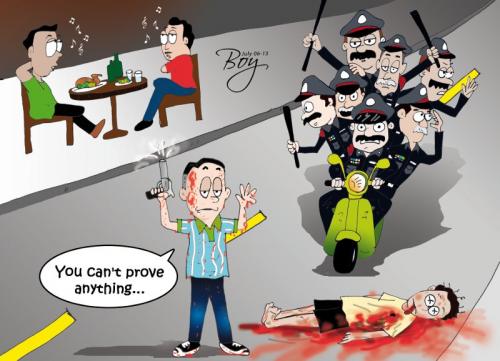Phuket Opinion: Shooting for Island Justice

PHUKET: The failure of police to bring to justice the man who shot and killed 21-year-old Ekkasit Sangangam in the heart of Phuket Town in early May last year will come as little surprise to veteran observers of Thailand’s criminal justice system.
A low-ranking officer assigned to the Patong Police was arrested and charged within minutes of the shooting, which took place on Phuket Town’s infamous Phun Phol Soi 11 (story here). Also arrested was his brother, who was charged with conspiracy to commit murder.
Despite having all of the initial indications of being a ‘slam dunk’ case, police were either unwilling or unable to gather sufficient evidence for the Prosecutor’s Office to try the case in court.
It is of course impossible to know with certainty what actually transpired that night, but the lack of transparency and unwillingness of the police and Public Prosecutor to comment on the details of the “investigation” is disturbing in itself – and will do little to overturn widespread public perceptions that members of the law-enforcement community effectively live above the laws they are sworn to uphold.
At last report, Phuket Governor Maitri Inthusut had yet to sign off on the document sent to him by the Prosecutor’s Office indicating the intent of that office to drop the case. This means there is still time to re-investigate and try to collect more evidence that might lead to a trial and possible conviction.
It might not be easy getting people who were in the red light district in the early hours to testify, but as past investigations into murders of foreign tourists have shown on many occasions, the course of justice can run very swiftly when the police are under pressure to make arrests or finesse confessions.
Sadly, and as many cases involving alleged misdeeds by officials in the past have shown us, the opposite also appears to be true.
Those entrusted to enforce the law should be held to a higher level of accountability than the average citizen, not lower. In fact, our laws embody this notion. Prison terms for human trafficking convictions are twice as long for government officials than civilians, and three times as long for officials whose job is to prevent the illegal movement of people in the country (story here).
To our knowledge, we are the only news outlet to follow this particular case to what some cynics might refer to as its “inevitable conclusion”. For the sake of maintaining public trust, we hope that Governor Maitri will not sign off on the case dismissal without first ordering a re-investigation, or at least issuing a clear statement as to why the officer suspected should once again be free to walk the streets with impunity.
Latest Thailand News
Follow The Thaiger on Google News:


























